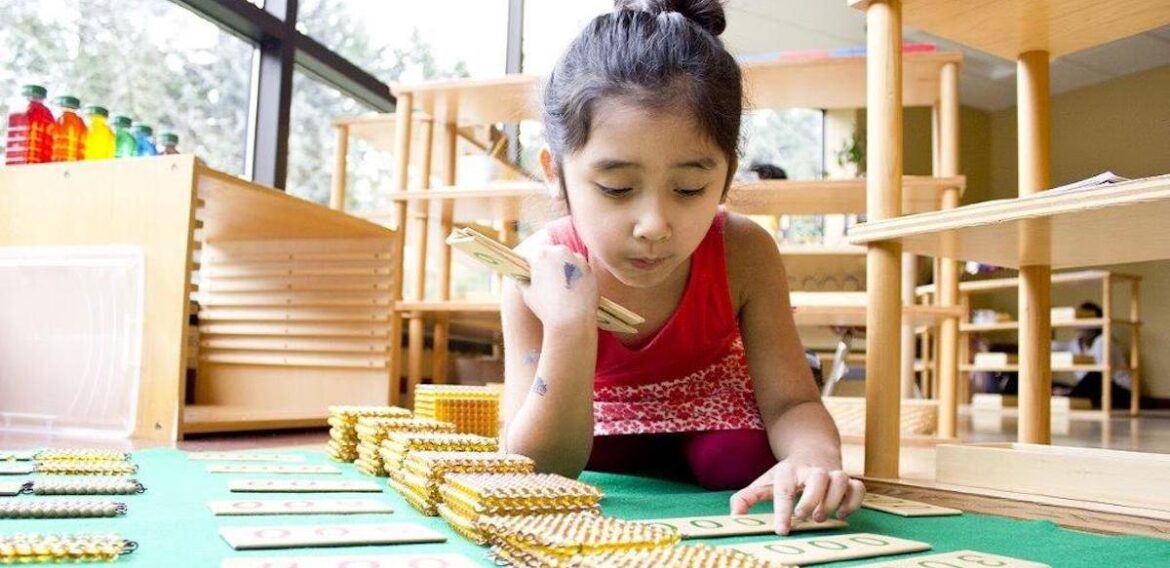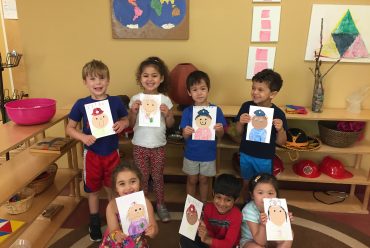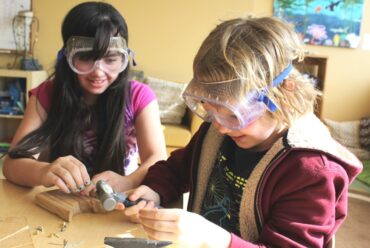Why Montessori Kindergarten vs Traditional Kindergarten?
Why choose Montessori Kindergarten instead of traditional kindergarten? Montessori kids have much higher achievement.
Children all develop at different paces, and they have different strengths and interests. While in a traditional Kindergarten classroom every child must follow one path set out by the teacher, a Montessori Kindergarten education follows the individual child’s interests using observation. Montessori Kindergarten classrooms are intentionally prepared in advance according to each child’s requirements. This includes student-centered lessons and activities where children are allowed to choose their work location, activities, and the duration of time spent on each activity.
Researchers from Frontiers in Psychology tested approximately 140 students at the start of the preschool and found that both the Montessori and traditional students began at age three with similar achievement scores. The 70 students who went to the Montessori schools advanced more rapidly on math and literacy tests over the next three years. At the end of kindergarten, when this study ended, the Montessori Kindergarten students had significantly higher achievement. (U.S. News, 2018)
Classroom Grouping
Traditional Kindergarten: Grouped by Age
In a traditional kindergarten classroom setting, students are grouped by age. Typically, all students in standard kindergarten programming will be aged 5 and 6 and most school administrations have clearly defined guidelines based on birthdate. Curriculum and learning activities are based on the development of the average kindergarten-aged student. Many students can find success because they can progress at the expected pace, but for students that struggle to keep up, feelings of frustration or discouragement can be a challenge.
Montessori Kindergarten: Mixed-Age Groupings
In Montessori Kindergarten classroom, children are grouped by stage of development. This means a Montessori Kindergarten classroom environment will typically have children aged 3-6 in the same learning environment. The Montessori mixed-age class provides the opportunity for children to progress through activities at their own pace in each subject area, even if they are slower at mastering certain skills than their same-aged peers. The mixed-age classroom also provides enhanced opportunities for older, kindergarten-aged children to assume roles of leadership with younger students in the classroom community.
Curriculum
Traditional Kindergarten: Teacher-Led/Group Learning
Often, in a traditional kindergarten classroom, the school day is structured and scheduled with very specific target outcomes. This is a very typical way for educators to manage a standard kindergarten classroom. The teacher will introduce a concept, then lead students through an exercise to reinforce the concept with clear expectations and measures of success. Students are expected to stay in place and complete activities within a designated time.
Montessori Kindergarten: Child-Led/Independent Learning
In a Montessori classroom, students explore subject areas as they are inspired to and at their own pace. The classroom is designed to facilitate independent learning and provide opportunities for children to explore with hands-on activities, interact with other students, and move between activities as they choose. Dr. Maria Montessori believed that learning is linked to movement and that physical activity can increase focus and improve cognitive function. In a Montessori classroom, the teacher is there to guide, but not direct.
Measures Of Success
Traditional Kindergarten: Performance Assessments/ Standardized Curriculum
Many traditional kindergarten programs follow a standardized curriculum set out by a board and implemented in all classrooms throughout a district. This curriculum typically defines expected outcomes by the end of the school year such as reciting the alphabet and recognizing a certain number of sight words. Children are assessed throughout the school year with a concise competency-based grading system. This does not mean that students will necessarily receive an A, B, or C or a percentage grade, but students are measured against expected achievements typical for their age.
Montessori Kindergarten: Progression Not Performance
In a Montessori kindergarten program, the emphasis is on progress and continuous learning rather than on a grade. By removing the grading system, children are motivated by a love of learning and inspired to improve rather than simply striving for better grades. Students are encouraged to explore through hands-on activities, to make mistakes and learn from them, develop critical thinking as they strive to develop independence, and set goals for their own progress. Montessori teachers will diligently observe students to determine when they are ready to learn a new skill. This observation allows teachers to communicate with the parents and with the child when more encouragement and improvement is needed and when a skill has been mastered. Progress is reported in a narrative form rather than a metric.
FAQ’s
What makes a child better suited for a Kindergarten Montessori School than other traditional or conventional private or public schools?
Children have free access to activities, and they are allowed to explore without boundaries. Providing opportunities for students to figure things out on their own which fosters independence, critical thinking, self-confidence, and general curiosity for life.
Does Montessori Kindergarten work for everyone?
The flexibility of Montessori is what makes it work for every child. Materials are provided that entice the senses and get children working with their eyes, ears, and hands. The environment is also designed to allow for discovery, keeping children engaged throughout the school day, and thus easily accessible to children who learn in different ways.
Explore the benefits of a Montessori Kindergarten learning approach for your child versus a traditional or conventional education.
There are advantages to both traditional and Montessori kindergarten programs. But we believe that every child can benefit from the nurturing, inspired, individualized learning environment of a Montessori kindergarten classroom. Kindergarten is a foundational year and can set the tone for the experience of learning for a lifetime. The skills cultivated in a Montessori program will prepare your child to adapt well, meet and exceed learning outcomes, find their unique place in the community of any school environment, and achieve success as they thrive through every grade.







